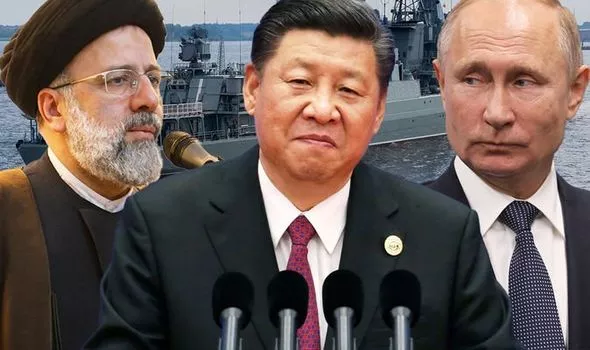by Suren Sargsyan
On March 15, naval forces from China, Iran and Russia joined together in drills, as China’s Defense Ministry released a statement. On March 20, Chinese President Xi Jinping visited Moscow, becoming one of the most significant and influential world leaders visiting Russia since the beginning of the Ukraine war. On March 21, Iran’s supreme leader, Ayatollah Ali Khamenei, said that the United States is not interested in putting an end to the war in Ukraine, which he maintains the Western military alliance created. Moreover, earlier this month, China mediated an agreement between Iran and Saudi Arabia that is expected to result within weeks in the two rivals restoring their diplomatic relations after seven years. In the process, Beijing has positioned itself as a new political player in the region. It appears that a new informal alliance has already been formed, mainly targeting US interests in Eurasia and the Middle East at large.
The reaction from Washington was pretty calm. US National Security Council spokesperson John Kirby said that the White House was not concerned by the joint training exercise. Kirby said the US and other nations conduct training exercises all the time and this won’t be the first time that the Russians and Chinese have trained together. “We’re going to watch it, we’ll monitor it, obviously, to make sure that there’s no threat resulting from this training exercise to our national security interests or those of our allies and partners in the region,” Kirby said, “But nations train. We do it all the time. We’ll watch it as best we can.” It should be fair to note that he is right, and military exercises are a normal phenomenon, but the problem is that now the military exercises are taking place at a time of extreme tension between Russia, Iran and China on the one hand and the collective West on the other hand.
Read also

Suren Sargsyan
Russia, China, and Iran are countries with diverse interests and complex relationships with the United States. While they may not have a formal alliance, they have been known to cooperate in various ways to challenge the influence and power of the US. Russia, China, and Iran are all major regional powers that seek to advance their interests and expand their influence. They view the US as a global superpower that has historically challenged their interests, and thus may seek to cooperate to counterbalance US influence. The US and these three countries have different political systems and ideologies. Russia, China, and Iran may view the US as a threat to their own political systems and may therefore work together to challenge US-led norms and processes.
The US is a major economic power and competitor to China, and places significant pressure and economic sanctions against Iran and Russia. Naturally, these countries may cooperate to protect their economic interests and challenge the dominance of the US in global politics, security architecture and economy. At the same time, Russia, China, and Iran are quite concerned and nervous about seeing the US as a security threat due to US military presence in regions of strategic importance to them, such as the Middle East and the Asia-Pacific region. It is obvious that these three states individually cannot compete with the US, let alone the collective West, and there is an important motivation for them to unite in the common challenge to reduce American influence.
Seeing this global picture, we need to realize that the South Caucasus region is strategically important for Iran, Russia, and China due to its energy resources, geopolitical location, transport routes, security concerns, and cultural ties. All these countries have been pursuing various economic and political strategies to advance their interests in the region. Russia and Iran are especially worried about the increasing significance of the Turkish role in the region as a result of the 2020 Karabakh war. Turkey, no matter how important a partner it is for Moscow and Tehran, is still considered as a US ally in the region and a member state of NATO, having one of the most powerful armed forces in this alliance and poses a serious challenge to Russia and Iran.
Considering all of the above, the answer to the question about the possibility of Russia, Iran and China creating a new informal alliance is that this scenario is possible. First of all, China has a policy of not joining any formal alliances, which means that an informal alliance is acceptable for it if there is a mutual benefit to be gained with any state. Moreover, China is trying to position itself not only as a global economy but also as a global political player.
In that regard, China might be interested in this kind of alliance with Russia and Iran to counterbalance the West. In their turn, Russia and Iran need China as a global economy, taking into consideration Western sanctions on their economies. Strong partnership in the economy may lead to a stronger partnership in the political arena. So, it may be concluded that the prospect of such an informal unification has become possible as a result of China’s growing economy and the US policy of driving Russia and Iran into a corner on all sides. At the end of the day, despite all contradictions, Russia, China and Iran are united by one target, the United States, and its influence in the Middle East, South Caucasus and Central Asia.



























































